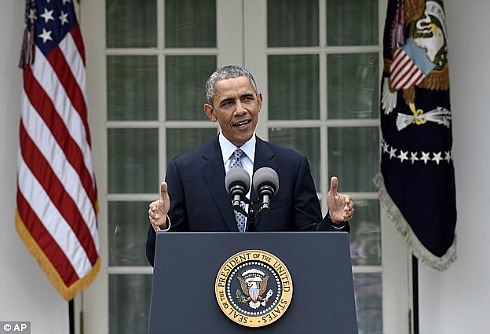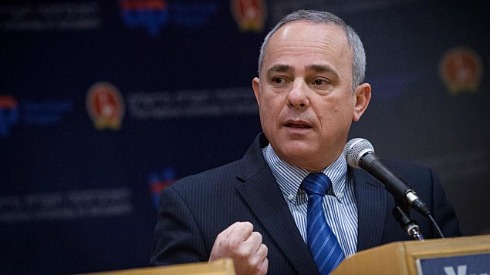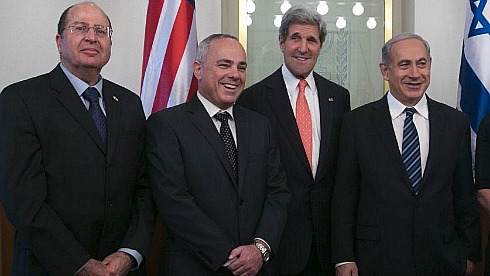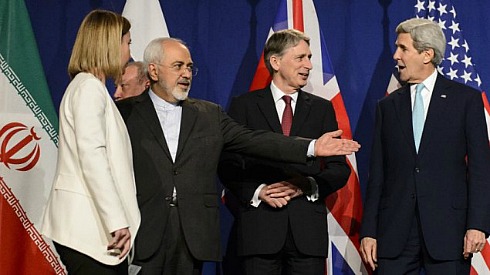Archives
AND MORE...

Reality-Based Leadership
_____________________

The Great Pontificator-In-Chief
_____________________

Another Day, Another Balcony
_____________________

We Lied
_____________________
Liar, Liar, Pants on Fire
_____________________
April 7, 2015
Falsehoods Galore
President Obama and his administration have been relentlessly pounding Israel Prime Minister Benjamin Netanyahu for his objections to the interim Iran deal reached last Thursday by the US and world powers.
"We believe that this is the best deal that can emerge from these negotiations," said Ben Rhodes, Deputy National Security Advisor for Strategic Communications and Speechwriting, whose fancy title obscures the fact that he is one of many political operatives in the Obama White House, with zero experience and even less knowledge in the areas they preside over.
"So when you hear the inevitable critics of the deal sound off, ask them a simple question: Do you really think that this verifiable deal, if fully implemented, backed by the world's major powers, is a worse option than the risk of another war in the Middle East?" asked Obama on Thursday, while defending his Iran diplomacy and treating its opponents with the kind of glib contempt we've come to expect from our BS'er-in-Chief.
Well, WSJ journalist Bret Stephens responded to that question today, in an excellent op-ed entitled Obama and the 'Inevitable Critics', with: "Yes, it's worse. Much worse."
As for President Obama's challenge to critics to put-up-or-shut-up, Israel did indeed put out a list of requirements and changes on Monday that could turn the Iran framework agreement into a more acceptable final deal (see below).
Will the Obama White House (seriously) consider Israel's recommendations? Or will it revert to its practice of obfuscating, lying and deriding critics?
Should the American people believe the Iranian regime, which has yet to abide by any signed agreement and has admitted to being, or proven to be liars (e.g., "We Lied")? Or should the American people believe the Obama administration, which has been lying to them from day one?
A recent example is Obama's announcement following the conclusion of negotiations in Lausanne. In it he again mentioned the nonexistent "fatwa", and stated as fact that Iran's Supreme Leader has issued a fatwa against the development of nuclear weapons. WRONG. Such a fatwa has never been issued, and to this day no one has been able to show it.
So what's one little lie like that compared to the falsehoods galore we've been exposed to in the past 7 years?
Times of Israel | April 6, 2015
Israel Sets Out Key Changes For A Better Deal With Iran
Minister lists components of a more effective agreement, including no Iranian R&D on centrifuges, 'anywhere, anytime' inspections; poses 10 questions about current 'irresponsible' framework
By Times of Israel staff

President Barack Obama speaks in the Rose Garden of the White House in Washington, Thursday, April 2, 2015, about the breakthrough in the Iranian nuclear talks. (photo: AP/Courtesy: dailymail.co.uk)
Israel on Monday set out a series of requirements and changes that it said could turn the framework agreement reached last Thursday by US-led negotiators with Iran into a more acceptable final deal.
It also issued a document posing 10 questions that it said underlined “the extent of the irresponsible concessions given to Iran” in the agreement, and that it claimed made clear “how dangerous the framework is for Israel, the region and the world.
The document was distributed by Israel’s Strategic Affairs Minister Yuval Steinitz, a Likud party member and confidant of Prime Minister Benjamin Netanyahu.

Yuval Steinitz (Photo credit: Miriam Alster/FLASH90)
Meeting with reporters in Jerusalem, Steinitz demanded a series of changes to close key loopholes as the final terms are negotiated ahead of a June 30 deadline. He presented the demands after Netanyahu reiterated in a series of US TV interviews on Sunday that Israel does not oppose any deal with Iran, but rather demands a “better deal.”
The changes set out by Steinitz include: Barring further Iranian R&D on advanced centrifuges; significantly reducing the number of centrifuges Iran would have available to press back into service if it violates the deal; shuttering the Fordo underground enrichment facility; requiring Iran’s compliance in detailing previous nuclear activities with possible military dimensions; shipping its stockpile of lower-enriched uranium out of the country; and ensuring “anywhere, anytime” inspections of Iran’s facilities.
Such changes, said Steinitz, would render a final deal “more reasonable.”

US State of Secretary John Kerry with Defense Minister Moshe Yaalon (left) Minister Yuval Steinitz (second left), and Prime Minister Benjamin Netanyahu in Jerusalem on May 23, 2013. Photo credit: Marc Israel Sellem/POOL/FLASH90)
The document distributed by Steinitz (see accompanying PDF here) reiterated Netanyahu’s assertion that “a better deal” can and must be reached. It protested that the framework agreement reached in Lausanne, Switzerland, and hailed by President Barack Obama as “historic,” “ignores the threat posed by Iran’s nuclear program to Israel.” By contrast, it charged, “great consideration” was given to Iran, “an enemy of the Unites States, whose regime, even during the negotiations, continued to conduct aggression in the region and to call for the destruction of Israel.”
It charged that “the framework deal does not block Iran’s path to the bomb. By removing the sanctions and lifting the main restrictions on Iran’s nuclear program in about a decade, this framework paves Iran’s path to a bomb.”
Echoing criticisms leveled by Netanyahu since the deal was reached, the document further protested that “not a single nuclear facility will be shut down. Iran will be permitted to continue its advanced centrifuge R&D, and [the issue of] its intercontinental ballistic missile program remains unaddressed.”

From left: EU High Representative for Foreign Affairs and Security Policy Federica Mogherini; Iranian Foreign Minister Mohammad Javad Zarif; British Foreign Secretary Philip Hammond; and US Secretary of State John Kerry line up for a press announcement at the nuclear talks in Lausanne, Switzerland, April 2, 2015. (photo credit: AP/Keystone, Jean-Christophe Bott)
Apart from what it called “the significant differences in the parties’ interpretations of the framework – reflected in the conflicting statements and ‘fact sheets’ they issued” — the Israeli document posed the following 10 questions:
1. Why are sanctions that took years to put in place being removed immediately (as the Iranians claim)? This would take away the international community’s primary leverage at the outset of the agreement and make Iranian compliance less likely.
2. Given Iran’s track record of concealing illicit nuclear activities, why does the framework not explicitly require Iran to accept inspections of all installations where suspected nuclear weapons development has been conducted? Why can’t inspectors conduct inspections anywhere, anytime?
3. Will Iran ever be forced to come clean about its past nuclear weaponization activity?
4. What will be the fate of Iran’s stockpile of enriched uranium?
5. Why will Iran be allowed to continue R&D on centrifuges far more advanced than those currently in its possession?
6. Why does the framework not address Iran’s intercontinental ballistic missile program, whose sole purpose is to carry nuclear payloads?
7. Following Iranian violations of the framework, how effective will be the mechanism to reinstitute sanctions?
8. What message does the framework send to states in the region and around the world when it gives such far-reaching concessions to a regime that for years has defied UNSC resolutions? Why would this not encourage nuclear proliferation?
9. The framework agreement appears to have much in common with the nuclear agreement reached with North Korea. How will this deal differ from the North Korean case?
10. Why is the lifting of restrictions on Iran’s nuclear program in about a decade not linked to a change in Iran’s behavior? According to the framework, Iran could remain the world’s foremost sponsor of terror and still have all the restrictions removed. Instead, the removal of those restrictions should be linked to a cessation of Iran’s aggression in the Middle East, its terrorism around the world and its threats to annihilate Israel.”
The document ended with the assertion that “the alternative to this framework is a better deal, one that will significantly dismantle Iran’s nuclear infrastructure, bring about a cessation of its aggression in the region and terrorist activities around the world, as well as end its efforts to destroy Israel. The framework deal does not block Iran’s path to the bomb. By removing the sanctions and lifting the main restrictions on Iran’s nuclear program in about a decade, this framework paves Iran’s path to a bomb. The result will be a dramatic increase in the risks of nuclear proliferation and an increase in the chances of a terrible war.”
Original article here.
Log In »
Notable Quotables
"Mr. Netanyahu is one of the most media-savvy politicians on the planet. On Friday he appeared live via video link on 'Real Time with Bill Maher,' taking the host’s alternately sardonic and serious line of questioning with gazelle-like alacrity."
~ Anthony Grant, jourrnalist who has written for many major newspapers and worked in television at Paris and Tel Aviv, interviewing former PM Benjamin Netanyahu on Monday, at the outset of Mr. Netanyahu's new book (more here).


